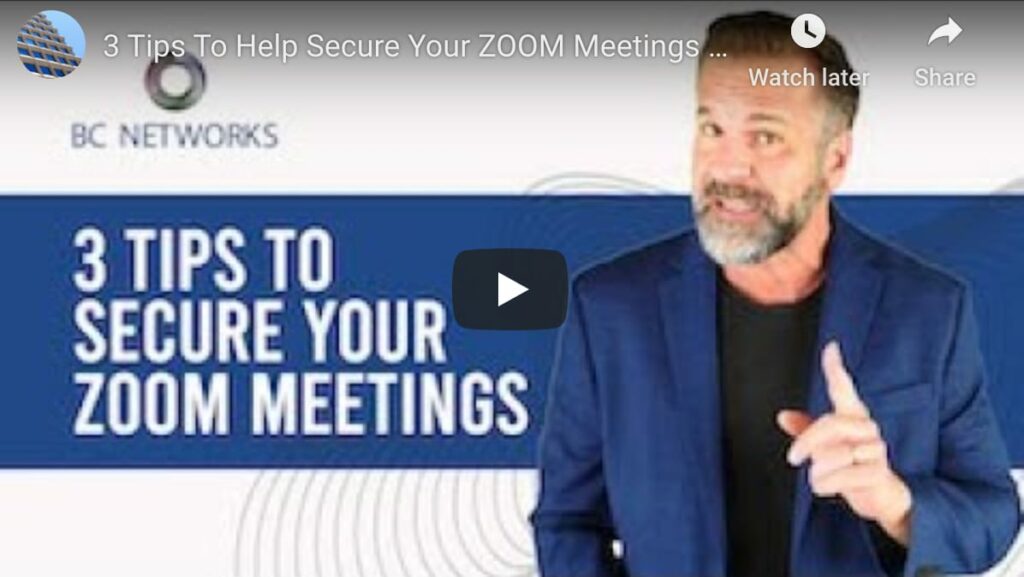BC Networks: Blog

How to Keep Your Zoom Meetings Secure
Keep Your Zoom Meetings Secure
Zoom has quickly become a standard part of the business day. With millions of employees displaced from offices and working from home, companies have turned to Zoom as a videoconferencing solution. Zoom meetings, with Brady Bunch-like grids of participants, are increasingly common.
As Zoom has become a prevalent part of the workday for many workers, it’s also become the target of hackers and others who are disrupting meetings and school gatherings. Fortunately, there are security settings within the software app itself that can keep your Zoom gatherings protected.
How Are Zoom Meetings Being Attacked?
Zoom is a videoconferencing platform that allows for informal meetings, lectures, classes, webinars and large gatherings. In late April, company founder and CEO Eric Yuan announced the app had hit 300 million daily users, up from 200 million in March. Those numbers are staggering, given that Zoom saw peak daily usage of 10 million in 2019.
The company has had to scramble recently to address many security and privacy issues identified since the app’s use jumped. Many of these security lapses resulted in the “zoombombing” phenomenon, wherein unwanted participants disrupted Zoom calls with music, pornography or inappropriate comments.
Zoombombing may be considered disruptive only. However, it carries potential security risks if someone infiltrates a meeting where participants share and discuss proprietary or private information. Hackers could easily capture this information and steal sensitive data.
What Is Zoom Doing to Protect Online Meetings?
In the past several months, Zoom has responded to the security and privacy issues with several steps:
- Released a new version, Zoom 5.0, with advanced data encryption standards
- Changed default settings for requiring passwords, using waiting rooms (which allow hosts to admit attendees manually), muting and screen sharing
- Removed a feature that stopped the app from collecting information via the Login with Facebook feature when using iOS operating systems. The login option is still there but the app no longer collects device information it had been gathering
- Updated its privacy policy
- Added new guides and help aids for educational users
- Removed several features, including a LinkedIn Sales Navigator app and an attendee attention tracker
- Allowed account managers to customize the data center regions used for real-time traffic, following complaints that some calls were routed through Chinese servers
How Can We Keep Zoom Meetings Secure?
While these safeguards are intended to secure Zoom at the source, businesses can take steps to protect their users and information. Here are some helpful Zoom usage tips:
- Treat your Zoom information like any other sensitive user information, including login credentials
- Do not share Zoom meetings and passwords on social media. Instead, communicate via email
- Use Zoom password settings. Some people have been concerned that requiring a password will deter attendees, but it’s an important safeguard
- Use a unique meeting ID for each session. Do not use the personal meeting ID, especially for large gatherings
- Enable the virtual waiting room feature. Hosts can see who is waiting to enter via a sidebar on the Zoom app and admit them, remove them or send a message
- Do not allow screen sharing unless necessary
- Do not record meetings unless needed
- Diable the Join Before Host feature
- If all your attendees are present, use the Lock Meeting feature to block others, including those with your meeting ID and password, from entering
- Make sure Zoom emails and websites include the zoom.us address, which is Zoom’s official domain
BC Networks is here to help you with your technology and cybersecurity needs, especially with remote work tools, during these challenging times. To learn more about our comprehensive technology services, contact us today.






